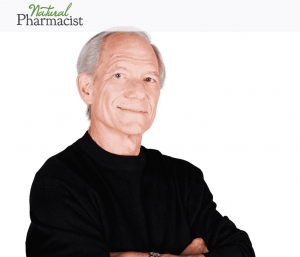Coenzyme Q10 is a fat-soluble vitamin-like substance. It is not classified as a vitamin because the human body naturally produces Coenzyme Q10. Unfortunately, the bio-synthesis of Coenzyme Q10 declines as we age. Furthermore, we know that CoQ10 levels tend to be lower in individuals with heart disease and in individuals who are taking cholesterol-lowering drugs called statins [1].

Guest author this week is Dr. Ross Pelton, the natural pharmacist. Dr. Pelton is the author of Rapamycin: Rapamycin, mTOR, Autophagy & Treating mTOR Syndrome. The book is available from amazon.com.
Fortunately, CoQ10 supplements are safe, well-tolerated, and affordable. Clinical trial evidence shows that CoQ10 supplements can be beneficial in the treatment of chronic heart failure and in the prevention of migraines [1].
In this review article, we summarize the outcomes of clinical studies of CoQ10 supplementation.
Absorption and Bioavailability of Coenzyme Q10
In 2019, Lopez-Lluch et al reported the findings from tests of seven different supplement formulations containing 100 mg of Coenzyme Q10 each [2]. The study participants were 14 young, healthy individuals. The study design was a double-blind crossover design. The researchers used wash-out periods of four weeks between intakes.
Salient findings included the following outcomes:
- There were considerable individual differences in the absorption and bioavailability of the CoQ10 preparations.
- The manufacturer’s choice of carrier oils and heating/cooling process affected the uptake of the Coenzyme Q10 bioavailability in humans.
- The best formulated ubiquinone supplement had a significantly better bioavailability than the ubiquinol supplement did. This indicated that the formulation of the CoQ10 supplement is more important for absorption and bioavailability than the redox form of the Coenzyme Q10, i.e., whether the Coenzyme Q10 is in the ubiquinone or ubiquinol form.
Note: Evidence from Dr. William Judy’s large dog studies shows that the ubiquinol in orally ingested supplements is likely to be converted to the ubiquinone form of Coenzyme Q10 in the small intestines prior to absorption. The resulting ubiquinone is then converted back the ubiquinol form after absorption and transfer to the lymph system [3]. This begs the question: why buy a ubiquinol product when the ubiquinol apparently will be converted to ubiquinone before being absorbed?
Coenzyme Q10 and Cardiovascular Disease
In 2024, the pharmacologists Fladerer and Grollitsch conducted a review of 28 clinical trials involving heart failure patients. The review’s main outcomes were the following [4]:
- Supplementation with the ubiquinone form of Coenzyme Q10 has reduced cardiovascular death in patients with heart failure. (This has not been reported for ubiquinol supplementation.)
- The clinical studies testing ubiquinone supplements used test concentrations leading to cardiovascular benefits that were much lower than the test concentrations used in studies of ubiquinol supplementation.
- Based on the existing research literature, Fladerer & Grollitsch recommended using ubiquinone supplements instead of ubiquinol supplements for the prevention and treatment of cardiovascular disease in patients with heart failure.
Coenzyme Q10 and Female Reproductive Health
In 2023, Hornos-Carneiro et al summarized preclinical and clinical studies of the role of Coenzyme Q10 in female reproductive health [5]. They focused on Coenzyme Q10’s role in mitochondrial bioenergetics and as an antioxidant. They noted that age-related declines in human female reproductive potential are often characterized by decreases in Coenzyme Q10 status, by cellular mitochondrial dysfunction, and by increased oxidative stress.
Their research showed that CoQ10 supplementation improved female reproductive performance by scavenging harmful oxygen species free radicals. Thus, CoQ10 supplementation appears to be a low-risk and low-cost strategy to address female infertility associated with aging and with exposure to environmental chemicals.

Dr. William Judy has written extensively about the absorption and bioavailability, the safety, and the clinical efficacy of Coenzyme Q10 supplementation in his book Coenzyme Q10: The Substance That Powers Life. Available from amazon.com. ISBN: 978-87-7776-186-7.
Coenzyme Q10 and Chronic Heart Failure
In 2022, Claxton et al assessed the clinical effectiveness and cost-effectiveness of Coenzyme Q10 in the management of chronic heart failure with reduced ejection fraction [6]. Using data from 26 clinical trials comprising 2,250 study participants, the researchers concluded that, if prescribed, CoQ10 adjuvant treatment has the potential to be clinically effective and cost-effective for heart failure with a reduced ejection fraction.
They noted that low levels of endogenous Coenzyme Q10 exacerbate chronic heart failure. Chronic heart failure is a debilitating condition that accounts for an annual National Health Service expenditure of £2.3B (ca. $2.9B). Accordingly, CoQ10 supplements might improve symptoms and slow disease progression. Moreover, CoQ10 supplementation might be particularly beneficial for patients taking statin medications.
Coenzyme Q10 and Inflammation-Related Biomarkers
In 2023, Hou et al reviewed 31 Coq10 clinical studies that included 1,517 study participants [7]. The meta-analysis of the pooled data showed that the CoQ10 supplementation significantly increased the concentration of circulating Coenzyme Q10. The CoQ10 supplementation significantly reduced the circulating levels of the inflammation bio-markers C-Reactive Protein, Interleukin-6, and TNF-alpha.
Coenzyme Q10 and Longevity and Anti-Aging Effects
In 2019, Mantle & Hargreaves reviewed the research literature relating CoQ10 supplementation to the prevention and management of degenerative disorders that affect aging [8]. Thus, randomized controlled studies showed that supplementation with Coenzyme Q10 significantly reduced mortality in patients with cardiovascular disease. In addition, CoQ10 supplementation improved glycemic control and vascular dysfunction in type 2 diabetes patients, improved renal function in chronic kidney disease patients, and reduced liver inflammation in non-alcoholic fatty liver disease patients. Supplemental Coenzyme Q10 conferred health benefits in degenerative disorders because of Coenzyme Q10’s roles in cellular energy generation, in antioxidant protection, and in anti-inflammatory activity.
Coenzyme Q10 and Male Infertility
In 2022, Alahmar et al reviewed the research literature about Coenzyme Q10 and male infertility. The review showed that CoQ10 supplementation significantly improved sperm CoQ10 concentrations, improved sperm parameters, and reduced sperm DNA fragmentation [9].
Coenzyme Q10 and Migraine Headaches
In 2021, Sazali et al analyzed the data from six studies with a total of 371 participants [10]. The pooled data showed no statistically significant reduction in the severity of migraine headache with CoQ10 supplementation. However, compared with the control group, the CoQ10 supplementation group experienced significantly reduced frequency and duration of headache attacks.
Coenzyme Q10 and Statin-Induced Myopathy
Statin drugs function by blocking an enzyme named HMG-CoA reductase. The enzyme is responsible for the synthesis of cholesterol. Blocking this enzyme effectively lowers elevated levels of total and LDL-cholesterol. However, blocking HMG-CoA reductase also blocks the body’s ability to synthesize coenzyme Q10 [11].
The medical term for the primary side effects associated with statin drug therapy is rhabdomyolysis. The symptoms of rhabdomyolysis, which are due to declining levels of CoQ10, are muscle aches and pain, muscle cramps, tiredness and weakness, exercise intolerance and dark-colored urine.
In 2021, in a report to a Journal of the American College of Cardiology focus seminar, Raizner & Quiñones reported that the weight of evidence as reflected in meta-analyses supports the use of exogenous Coenzyme Q10 in patients with statin-associated muscle symptoms. They also suggested that, given the outcomes of the Q-SYMBIO Study, there may well be a role for CoQ10 adjunctive treatment in patients with heart failure [12].
In 2018, Qu et al evaluated 12 randomized controlled trials with a total of 575 patients taking statins, 294 patients were in the CoQ10 supplementation group and 281 in the placebo group [13]. Compared with placebo, the CoQ10 supplementation ameliorated statin-associated muscle symptoms: muscle pain, muscle weakness, muscle cramp, and muscle tiredness. The researchers suggested that CoQ10 supplementation may be a complementary approach to manage statin-induced myopathy.
Coenzyme Q10: A Life Extension Nutrient
In the 1970s, Emile Bliznakov, MD, conducted pioneering research on CoQ10 and aging [14]. Bliznakov divided 100 female 16-18-month-old mice (equivalent to 60-70 year-old humans) into two groups (CoQ10 or placebo). These “old” mice were already showing signs of decreased immunity and declining bodily functions.
After 36 weeks, 100% of the control mice were dead while 40% of the CoQ10-treated mice were still alive. At the 56th week (which is two times longer than these mice would normally survive beyond the beginning of the experiment), 10% of the CoQ10-treated mice were still alive. At the 80th week (the last control mouse had died at week 36), four mice were still alive. At the 82nd week, the last mouse died. In human terms, this is a lifespan of roughly 130 years of age!
Conclusion: Need for Exogenous Coenzyme Q10
Coenzyme Q10 is a multi-tasking compound that performs several key functions in humans. It is a critically important fat-soluble antioxidant, it is essential for the production of energy within mitochondria and it plays a role in regulating immune function.
Optimal biosynthesis of CoQ10 in humans occurs in the mid-twenties. Thereafter, blood and tissue levels of CoQ10 gradually and continually concentrations decline with increasing age beyond the age of 40 years [15].
The reduced concentrations of Coenzyme Q10 are associated with an increased risk of degenerative disease affecting longevity [16].
Supplementation with Coenzyme Q10 is necessary to make up the difference. [17].
There is considerable difference in the absorption and bioavailability of CoQ10 supplements. It is imperative to buy a CoQ10 supplement with proven absorption. [18].
Sources
1. Mayo Clinic Staff. Coenzyme Q10. 9 August 2023. Retrieved from https://www.mayoclinic.org/drugs-supplements-coenzyme-q10/art-20362602.
2. López-Lluch G, Del Pozo-Cruz J, Sánchez-Cuesta A, Cortés-Rodríguez AB, Navas P. Bioavailability of coenzyme Q10 supplements depends on carrier lipids and solubilization. Nutrition. 2019 Jan;57:133-140.
3. Judy WV. The Instability of the Lipid-Soluble Antioxidant Ubiquinol: Part 2-Dog Studies. Integr Med (Encinitas). 2021 Oct;20(5):26-30.
4. Fladerer JP, Grollitsch S. Comparison of Coenzyme Q10 (ubiquinone) and reduced Coenzyme Q10 (ubiquinol) as supplement to prevent cardiovascular disease and reduce cardiovascular mortality. Curr Cardiol Rep. 2023 Dec;25(12):1759-1767.
5. Hornos Carneiro MF, Colaiácovo MP. Beneficial antioxidant effects of Coenzyme Q10 on reproduction. Vitam Horm. 2023;121:143-167.
6. Claxton L, Simmonds M, Beresford L, Cubbon R, Dayer M, Gottlieb SS, Hartshorne-Evans N, Kilroy B, Llewellyn A, Rothery C, Sharif S, Tierney JF, Witte KK, Wright K, Stewart LA. Coenzyme Q10 to manage chronic heart failure with a reduced ejection fraction: a systematic review and economic evaluation. Health Technol Assess. 2022 Jan;26(4):1-128.
7. Hou S, Tian Z, Zhao D, Liang Y, Dai S, Ji Q, Fan Z, Liu Z, Liu M, Yang Y. Efficacy and optimal dose of Coenzyme Q10 supplementation on inflammation-related biomarkers: A GRADE-assessed systematic review and updated meta-analysis of randomized controlled trials. Mol Nutr Food Res. 2023 Jul;67(13):e2200800.
8. Mantle D, Hargreaves I. Coenzyme Q10 and degenerative disorders affecting longevity: an overview. Antioxidants (Basel). 2019 Feb 16;8(2):44.
9. Alahmar AT, Singh R, Palani A. Sperm DNA fragmentation in reproductive medicine: a review. J Hum Reprod Sci. 2022 Jul-Sep;15(3):206-218.
10. Sazali S, Badrin S, Norhayati MN, Idris NS. Coenzyme Q10 supplementation for prophylaxis in adult patients with migraine-a meta-analysis. BMJ Open. 2021 Jan 5;11(1):e039358.
11. Littarru GP, Langsjoen P. Coenzyme Q10 and statins: biochemical and clinical implications. Mitochondrion. 2007 Jun;7 Suppl:S168-74.
12. Raizner AE, Quiñones MA. Coenzyme Q10 for patients with cardiovascular disease: JACC Focus Seminar. J Am Coll Cardiol. 2021 Feb 9;77(5):609-619.
13. Qu H, Guo M, Chai H, Wang WT, Gao ZY, Shi DZ. Effects of Coenzyme Q10 on statin-induced myopathy: an updated meta-analysis of randomized controlled trials. J Am Heart Assoc. 2018 Oct 2;7(19):e009835.
14. Bliznakov EG. Aging, mitochondria, and coenzyme Q10: the neglected relationship. Biochimie. 1999 Dec;81(12):1131-2.
15. Kalén A, Appelkvist EL, Dallner G. Age-related changes in the lipid compositions of rat and human tissues. Lipids. 1989 Jul;24(7):579-84.
16. Mantle D & Hargreaves IP. op. cit.
17. Judy William V. The Substance That Powers Life: Coenzyme Q10, An Insider’s Guide. 2018. ISBN 978-87-7776-186-7. Available from amazon.com.
18. Lopez-Lluch G. op. cit.
The information presented in this review article is not intended as medical advice. It should not be used as such.









Leave A Comment